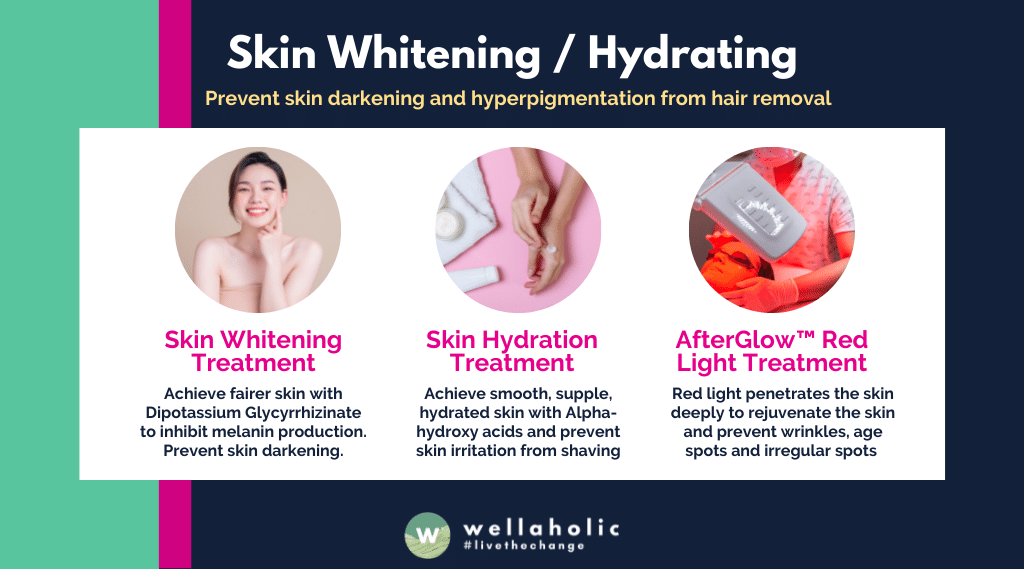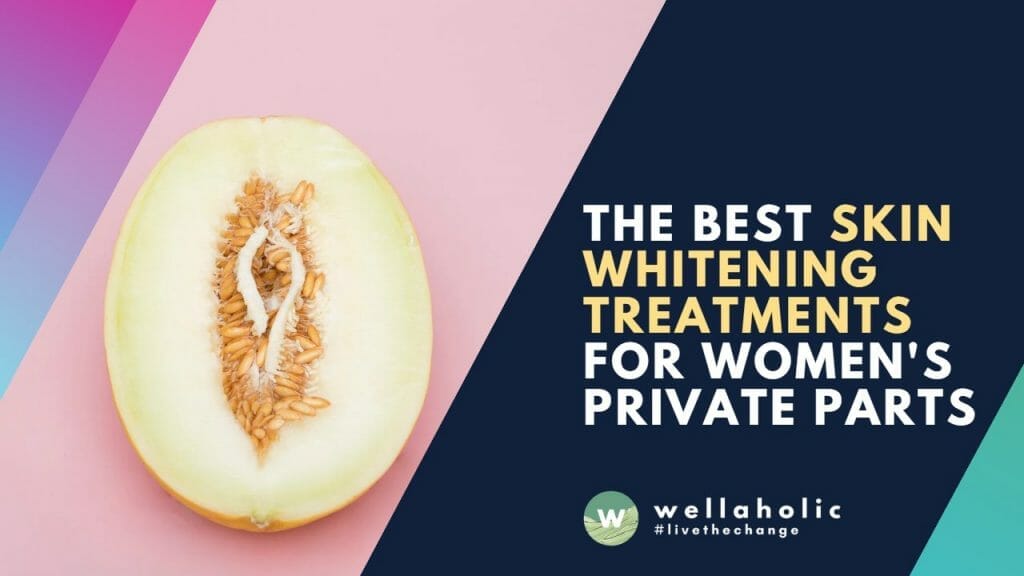
The Best Skin Whitening Treatments for Women’s Private Parts
Table of Contents
- 0.1 TL:DR Summary
- 0.2 Introduction
- 0.3 Causes of skin darkening in private areas
- 0.4 Types of skin whitening treatments
- 0.5 Top 5 skin whitening treatments for women’s private parts
- 0.6 What to consider before choosing a skin whitening treatment
- 0.7 Safety precautions and tips for using skin whitening treatments
- 0.8 Conclusion
- 0.9 Frequently Asked Questions (FAQ)
- 0.10 Book Now Pay Later
- 0.11 Skin Whitening / Hydrating (PTT) by Wellaholic
- 1 The Best Skin Whitening Treatments for Women’s Private Parts: A Comprehensive Guide to Skin Lightening, Brightening, and the Top Whitening Creams
TL:DR Summary
- Skin Whitening Explained: Lightens skin, especially darker areas, for aesthetics, hygiene, or personal preference.
- Causes of Darkening: Hormones, shaving, tight clothing, age, genetics, and hygiene habits can darken private areas.
- Treatment Types: Includes topical creams, chemical peels, laser treatments, and DIY methods.
- Top Treatments: Popular options are topical creams, chemical peels, laser treatments, and Wellaholic’s specialized skin whitening treatment.
- Choosing the Right Treatment: Consider skin sensitivity, budget, desired results, and professional advice.
- Safety and Effectiveness: Follow instructions, do patch tests, and protect skin from the sun for safe treatment use.
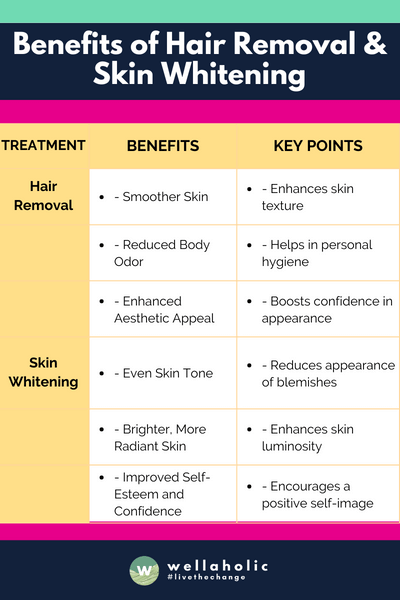
Introduction
As an Aesthetic Director with a rich background in the aesthetics industry, I’ve encountered a wide range of beauty concerns and interests from our customers. One topic that often arises, particularly among women, is the desire for safe and effective skin whitening treatments for private parts.
This is a sensitive area, both physically and in terms of personal comfort, and it requires a nuanced understanding and approach.
Intimate skin whitening: Explore safest, personalized options
In the detailed article that follows, I will explore the best skin whitening treatments suitable for women’s private parts, focusing on safety, efficacy, and the importance of a personalized approach.
This information is crucial for those seeking to enhance their confidence and comfort with treatments that are both respectful and effective.
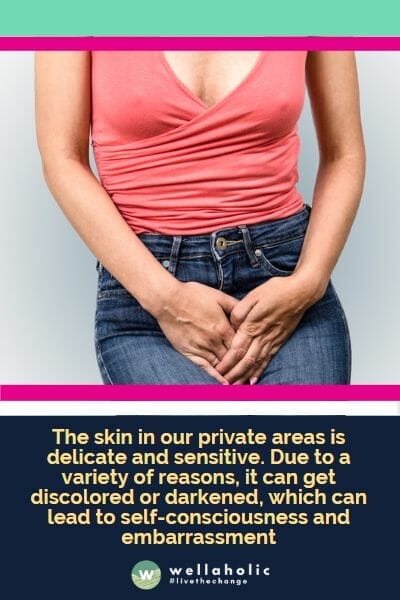
Causes of skin darkening in private areas
The skin in our private areas is delicate and sensitive. Due to a variety of reasons, it can get discolored or darkened, which can lead to self-consciousness and embarrassment. However, this is a common issue that affects many individuals, and there are various reasons behind it. Here are some of the factors that contribute to skin darkening in private areas:
Hormonal Changes and Imbalances
Hormonal changes and imbalances in the body can cause hyperpigmentation in the private areas. These changes can be due to various reasons, such as pregnancy, menopause, or hormonal treatments.
Regular Shaving and Waxing
Frequent shaving or waxing can cause skin irritation, inflammation, and ingrown hairs, which can lead to skin darkening in private areas. This is because these hair removal methods can damage the skin’s surface, leading to discoloration.
Tight Clothing and Underwear
Wearing tight clothing and underwear can cause friction and irritation, leading to skin darkening in the private areas. This is because tight clothing and underwear can trap sweat and moisture, leading to the growth of bacteria and fungi, which can cause skin discoloration.
Age and Genetics
As we age, our skin’s natural renewal process slows down, leading to the accumulation of dead skin cells, which can cause skin darkening. Additionally, genetics can also play a role in skin pigmentation, which can lead to skin darkening in the private areas.
Poor Hygiene Habits
Poor hygiene habits can also cause skin darkening in the private areas. This is because lack of cleanliness can lead to the growth of bacteria and fungi, which can cause skin discoloration.

Types of skin whitening treatments
If you’re looking to brighten and lighten your skin, there are several types of treatments available, each with its own benefits and drawbacks. Here’s a breakdown of the most popular skin whitening treatments:
Topical Creams and Serums
Topical creams and serums are one of the most accessible and affordable ways to whiten your skin. These products typically contain ingredients such as hydroquinone, kojic acid, and vitamin C, which work to inhibit the production of melanin and reduce the appearance of dark spots and hyperpigmentation.
Chemical Peels
Chemical peels involve applying a solution to the skin, which causes the top layer of skin to peel off, revealing lighter, brighter skin underneath. These treatments can be effective for treating a variety of skin concerns, including dark spots, acne scars, and uneven skin tone.
Laser Treatments
Laser treatments use intense pulses of light to target and break down melanin in the skin. These treatments can be effective for reducing the appearance of dark spots, age spots, and other types of hyperpigmentation.
DIY Treatments
While not as effective as professional treatments, there are several DIY treatments you can try at home to whiten your skin. These include natural remedies such as lemon juice, turmeric, and yogurt, as well as at-home chemical peels and light therapy devices.
Before deciding on a skin whitening treatment, it’s important to consult with a dermatologist or other skincare professional to determine which treatment is right for you. Keep in mind that some treatments may not be suitable for certain skin types or conditions, and that results may vary depending on the individual.
A 2018 study in Mumbai, India, compiled by Wellaholic Research, found 54% of respondents had used skin whitening products at some point, and 38% were using them at the time

Top 5 skin whitening treatments for women’s private parts
Are you looking for a way to lighten and brighten your private areas? Here are the top 5 skin whitening treatments that are safe, effective, and widely used by women.
1. Topical Creams and Serums for private part whitening
Topical Creams and Serums for Private Part Whitening. Topical creams and serums are a popular and widely available option for whitening the intimate areas. These products are applied directly to the skin of the genitals, anus, nipples, or underarms to reduce the amount of melanin, or pigment, in the skin and make it appear lighter.
Types and Ingredients. There are many types of topical creams and serums for private part whitening, with different ingredients, formulas, and strengths. Some of the common ingredients include hydroquinone, kojic acid, arbutin, azelaic acid, vitamin C, niacinamide, and licorice extract. These ingredients work by inhibiting the enzyme tyrosinase, which is responsible for the production of melanin in the skin.
Benefits and Drawbacks. The benefits of using topical creams and serums for private part whitening are that they are easy to use, relatively affordable, and can produce visible results within weeks or months of regular use. However, there are also some risks and drawbacks associated with these products. Some of the potential side effects include skin irritation, inflammation, allergic reactions, dryness, peeling, burning, itching, redness, and increased sensitivity. In some cases, these products can also cause paradoxical darkening of the skin or ochronosis, a condition where the skin develops blue-black patches due to excessive use of hydroquinone.
2. Chemical Peels for private part whitening
Chemical peels are a cosmetic procedure that involves applying a chemical solution to the skin of the intimate areas, such as the genitals, anus, nipples, or underarms, to exfoliate and remove the outer layer of dead skin cells and reveal a lighter and smoother skin underneath. The chemical solution can contain different types of acids, such as glycolic acid, salicylic acid, lactic acid, or trichloroacetic acid, depending on the strength and depth of the peel.
3. Laser Treatments
Laser treatments are a cosmetic procedure that involves using a high-intensity beam of light to target the melanin, or pigment, in the skin of the intimate areas, such as the genitals, anus, nipples, or underarms, and break it down into smaller particles that can be eliminated by the body. The laser can be either ablative or non-ablative, depending on whether it removes or heats up the skin surface.
4. Skin Whitening Treatment by Wellaholic
Prevent Skin Darkening and Lighten Your Skin. Prevent skin darkening, and enhance the tone and suppleness of your skin after your hair removal session with our Skin Whitening / Hydrating (PTT) with AfterGlow red light treatment. Choose from either Whitening Therapy for hyper-pigmented or darkened skin, or choose our Hydrating Therapy for accelerated skin repair from the harsh SHR energy rays. End it off with our AfterGlow™ red light treatment which helps to repair and rejuvenate your treated skin.
Whitening Treatment. With dipotassium glycyrrhizinate which inhibits tyrosinase activity and melanin production. Hydrating Treatment – Helps calm inflammation and reduce irritation associated with hair removal treatments. AfterGlow – Red light therapy penetrates deeper into the skin to heal, repair and rejuvenate your skin.
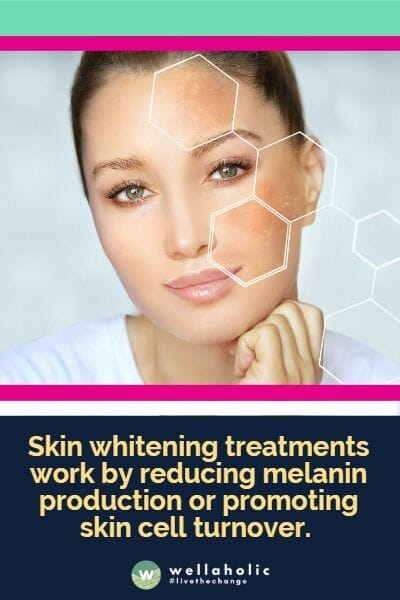
What to consider before choosing a skin whitening treatment
When considering a skin whitening treatment, there are a few important factors to keep in mind. Firstly, it’s essential to determine the cause of the skin darkening and whether a skin whitening treatment is the appropriate solution.
Additionally, you should research the different types of skin whitening treatments available and their effectiveness, potential risks and side effects, and any necessary downtime or recovery. It’s also crucial to choose a reputable and qualified provider and ensure that the treatment is suitable for your skin type and concerns.
Lastly, it’s important to have realistic expectations and understand that results may vary based on individual factors. By carefully considering these factors, you can make an informed decision about which skin whitening treatment is right for you.
Dark skin? Seek cause, risk side effects from whitening
Expert opinion by Dr. Seemal R. Desai, MD, FAAD, a clinical assistant professor in the Department of Dermatology at UT Southwestern Medical Center in Dallas, Texas, published in Dermatology Times on November 9, 2021 explains, “It is essential to determine the cause of the skin darkening and whether a skin whitening treatment is the appropriate solution.
Some skin whitening treatments can be effective, but they can also have side effects, such as irritation, dryness, and changes in skin color. “
Safety precautions and tips for using skin whitening treatments
When it comes to using skin whitening treatments, it’s important to take safety precautions to ensure that you don’t harm your skin or cause any adverse reactions. Here are some tips to keep in mind:
- Do a patch test first. Before using any skin whitening treatment, do a patch test on a small area of skin to see if you have any allergic reactions or irritation.
- Follow the instructions carefully. Read and follow the instructions on the product carefully to avoid overuse and potential side effects.
- Avoid using multiple treatments at once. Using multiple skin whitening treatments at the same time can increase the risk of side effects or irritation. Stick to one product or treatment at a time.
- Protect your skin from the sun. Skin whitening treatments can make your skin more sensitive to the sun, so make sure to use sunscreen or cover up with clothing when going outside.

Conclusion
In wrapping up, various potent skin lightening solutions exist for women’s intimate zones, each with its merits and downsides. Creams and serums are handy for use at home, while chemical peels and laser procedures, done professionally, yield more noticeable changes. Intimate lightening caters to delicate areas specifically, and DIY methods are cost-effective. The right treatment hinges on your skin’s unique traits and your financial capacity.
Over many years, our expertise at Wellaholic has honed the process of advising on and administering skin whitening treatments in Singapore, making sure they’re safe and meet your goals. Our consultative approach ensures a tailored solution, matching your needs and budget.
Frequently Asked Questions (FAQ)
What are the top skin whitening treatments available for women’s private parts?
A: The best skin whitening treatments for women’s private parts include laser therapy, chemical peels, and topical creams. These treatments are designed to address hyperpigmentation and uneven skin tone in intimate areas.
How does laser therapy help in whitening the skin in intimate areas?
A: Laser therapy, such as laser skin resurfacing, uses focused light energy to target melanin and reduce hyperpigmentation in intimate areas. It stimulates collagen production, resulting in a brighter and more even skin tone.
Are chemical peels safe and effective for skin whitening in private areas?
A: Yes, chemical peels containing gentle and safe ingredients can effectively exfoliate the skin and reduce pigmentation. They promote the growth of new, lighter skin cells, resulting in a more radiant appearance.
Can I use over-the-counter topical creams for skin whitening in intimate areas?
A: Over-the-counter creams might offer limited results. For effective skin whitening in intimate areas, it’s recommended to consult a professional who can provide medical-grade topical treatments designed for sensitive skin.
How many sessions are usually required to see noticeable skin whitening results?
A: The number of sessions needed varies based on individual factors, such as the severity of pigmentation. Generally, multiple sessions are recommended to achieve optimal and long-lasting skin whitening results.
Where can I get the best skin whitening treatments for women’s private parts in Singapore?
A: For the best skin whitening treatments in Singapore, consider Wellaholic’s specialized services. With a range of advanced treatments and experienced specialists, Wellaholic offers safe and effective options to help you achieve your desired results.

Serene Chiam, Aesthetic Director
Serene Chiam is the Aesthetic Director at Wellaholic, a well-known aesthetic chain in Singapore. She has more than ten years of experience in the aesthetics industry. With a Bachelor of Health Science (Aesthetics) and CIDESCO certifications, she expertly combines scientific knowledge with practical skills. Serene is known for her personalized approach to beauty, ensuring each Wellaholic client’s journey is unique and transformative. Her significant contributions have been pivotal in establishing Wellaholic’s reputation for excellence in aesthetic wellness.
Contact Serene at support@wellaholic.com
GET IN TOUCH
Book Now Pay Later
Skin Whitening / Hydrating (PTT) by Wellaholic
- ⭐ Prevent Skin Darkening from Hair Removal. Skin Whitening / Hydrating (PTT) prevents skin darkening (hyperpigmentation) and dryness after laser hair removal.
- ⭐ Whitening or Hydrating. Choose between whitening (half body) or hydrating (half body) based on your skin concerns.
- ⭐ AfterGlow™ Red Light. Finish with AfterGlow™ red light therapy to repair and rejuvenate your skin.
- ⭐ Award-Winning. Wellaholic’s treatments have been recognized by top beauty publications such as Daily Vanity, Beauty Insider, and Tropika Club Magazine.
- ⭐ Over 2000 Verified Customer Reviews. Wellaholic has over 30 industry awards and over 2000 positive reviews from customers, and >50% are repeat customers.
